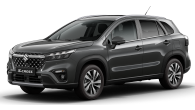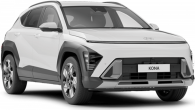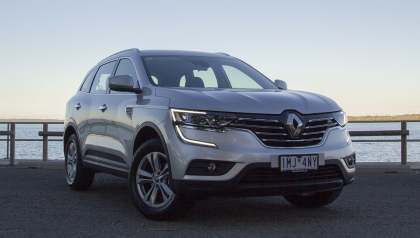Nissan X-Trails are everywhere, so they must be good, right? And the Ti is the top-of-the-range petrol grade with all-wheel drive, so it must be even gooder, err… better, yeah?
Safety in numbers then, go with the car lots of other people have chosen. That’s not a bad way to make a decision, the problem being that Mazda's CX-5 and Toyota’s RAV4 are hugely popular, too. And then you really need to consider Subaru’s new-gen Forester and Hyundai’s Tucson as well.
Suddenly it’s a lot harder to make the right choice, isn’t it?
So forget popularity and let’s judge the X-Trail Ti by breaking it down into eight criteria: its design, value, practicality, engine, fuel consumption, warranty and what it’s like to drive.
Nissan X-Trail 2019: ST 7 Seat (2WD)
| Engine Type | Inline 4, 2.5L |
|---|---|
| Fuel Type | Unleaded Petrol |
| Fuel Efficiency | 8.1L/100km (combined) |
| Seating | 7 |
| Price From | $18,040 - $22,770 |
| Safety Rating |
|
Is there anything interesting about its design?
7 / 10
Once upon a time, the X-Trail was boxier than a box, but not any more. This Nissan’s fine looks are one of its strengths. This is a mid-sized SUV that combines elegant curves that sweep over its wheel arches and through to its bonnet with a bold and determined looking front end, plus a cleanly styled tailgate.
There is, however, an X-Trail that is more beautiful than this one, and it’s called a Renault Koleos which is the French company’s re-styled version of its Japanese partner company’s SUV. But we’re not here to talk about that.
The Ti is the top-of-the-range petrol X-Trail and what sets it apart visually from the lower grades are the chrome strips which skirt under the doors, a panoramic sun roof, LED headlights, 19-inch aluminium-alloy wheels... and that’s it.

The dark tinted windows you can see on our test cars also come on the ST-L grade below, and so do those roof rails and fog lights.
What are the X-Trail’s dimensions? That’s a good question, because these pics I’ve taken make the X-Trail look bigger than it really is. At just under 4.7m long, 1.8m wide and 1.7m tall, the X-Trail is same height and width as a Subaru Forester but about 10cm longer.
The Ti’s insides don’t look much different from the ST-L’s either (are you starting to get the message here?) with the black leather seats and larger touchscreen.
While the exterior looks are an X-Trail strength, the same can’t be said for its cabin, which isn’t as modern and refined as rivals including the Mazda CX-5, Subaru Forester, Volkswagen Tiguan or Renault Koleos.
Does it represent good value for the price? What features does it come with?
7 / 10
The X-Trail range can seem a bit daunting with so many variants of this one model in the line-up, but all you need to know here is the Ti model we’ve tested sits at the top of the all-wheel-drive petrol versions and lists for $47,790, without any options.
Being the top grade, the Ti comes with the most standard features including a seven-inch touch screen, digital radio (DAB+), sat nav, dual-zone climate control, heated and power front seats, leather upholstery and roof rails.
The ST-L that sits below the Ti also comes with all those features. So, what does the Ti get extra? There are LED adaptive headlights, a heated steering wheel, auto tailgate with kick-open function, heated rear seats, Bose eight-speaker stereo, sun roof, and 19-inch alloy wheels.
The Ti also comes with more advanced safety equipment, too, which you can read about below.

So, back to your original question: is it good value? Sheesh, you'd have to say $47,790 is getting pricey, and while you are getting a mountain of features, that’s not always an indication of value.
I mean, it’s a bit like a hotel that offers colour TV, a swimming pool, a kettle, instant coffee, electric blankets, and has really friendly staff and clean rooms, but doesn’t have Netflix or Wifi. And did I mention the fridge just has a tiny carton of milk in it? Oh, and they charge the same amount as the hotel that does have all the cool modern stuff.
Look, for comparison, at the Renault Koleos – it’s the same truck as the X-Trail but has a more refined interior and more modern tech onboard as well, like Apple CarPlay and Android Auto.
Volkswagen’s top-spec Tiguan 162TSI costs under $50K and is a superb package, while Mazda’s CX-5 is outstanding, too – even the mid-range Touring grade comes with a head-up display and costs $38,590. Plus the top of the range Akera is cheaper, too, at $46,190, while even the priciest new-generation Subaru Forester (the 2.5i-S) is $41,490.
So I’m going to say that like that nice, roadside motel the X-Trail was once good value, but it's not any more, or not compared to its more modern and updated rivals.
How practical is the space inside?
7 / 10
To cut a long review short, the X-Trail Ti is practical, but a lower grade could be even more so for you.
Now, if you have more time, I’ll explain. First, the X-Trail is spacious - legroom in the second row is excellent and even at 191cm tall I have about 30mm between my knees and the seat back.
The problem is, the headroom back there is reduced by the sunroof (which comes standard on the Ti grade) to the point where I can’t sit up straight without my head touching the ceiling. So, if you’re carrying tall adults or kids then think about going for the ST-L grade below, which doesn’t come standard with the sunroof.
The Ti grade is a five-seater. If you’re after seven seats you’ll need to choose the ST or ST-L.
There’s no such headroom issue in the front seats, while good shoulder and elbow room and a sizeable footwell should accommodate 99.99 per cent of the people on this planet well.
Storage is also great. The boot is big, at 565 litres with the seats up (keep in mind these aren’t VDA litres like the ones Mazda and Volkswagen use) and with them down it opens up to 945 litres. Under the boot floor there is more storage and under that is a space-saver spare wheel.
Back-seat riders have directional air vents, small door pockets, seat back map pockets and two cupholders, but don’t’ get USB charging points, as you do in the Forester.
Up front there’s a decent-sized centre-console bin and glove box, another good storage area in front of the shifter, two cupholders and medium-sized door pockets.
For devices, there’s a USB port up front and three 12-volt outlets (two up front and one in the back).
What are the key stats for the engine and transmission?
7 / 10
The X-Trail Ti has a 2.5-litre, four-cylinder petrol engine. Only the entry grade ST comes with a manual gearbox, while the Ti and all the rest have a CVT auto.
The engine makes really only just enough grunt at 126kW/226Nm and the CVT causes that engine to drone a bit too loudly in my opinion, while making acceleration feel sluggish. That said, Nissan does make CVTs perform better than they used to.

The X-Trail Ti comes with a smart all-wheel-drive system. A dial on the centre console allows the driver to select from three modes: 2WD, which will send drive to the front wheels only, but will activate all-wheel drive if it detects a loss of traction; Auto, which monitors the four wheels and will distribute torque to maintain traction; while in LOCK the electronically controlled coupling splits the torque evenly between the front and back. The Lock mode works at up to 40km/h and will switch to Auto mode at higher speeds.
It’s important to remember that while the X-Trail Ti will handle a bit of mild off-roading, such as dirt and gravel roads, the vehicle isn’t equipped with High and Low range four-wheel drive, which is vital for serious off-road excursions.
How much fuel does it consume?
7 / 10
The Ti runs happily on 91 RON standard unleaded and Nissan says you should expect to see your fuel consumption after open and urban roads to be 8.3L/100km. I drove our test car how most will probably be driven and that is in 2WD and occasionally Auto mode on city roads and motorways for 160km, and my fuel usage measure s at the pump was 11.6L/100km.
Warranty & Safety Rating
What safety equipment is fitted? What safety rating?
8 / 10
The X-Trail was given the maximum five-star ANCAP rating when it was tested in 2017 and the Ti comes with an outstanding amount of advanced safety equipment. Coming standard is AEB which will brake automatically to avoid a collision with another car at speeds over 5km/h and will brake to avoid an impact (as best it can) with pedestrians from 10-60km/h. There’s also rear cross traffic alert, lane-departure warning and lane-keeping assistance, plus adaptive cruise control, which worked well for me on motorways.
The only real chink in the armour here is a very low-fi one, yet crucial – the Ti has a space-saver spare. The Subaru Forester has a full-sized spare. Surely an SUV that touts a bit of off-road ability being sold in the Australian market should come with a full-sized spare wheel?
What does it cost to own? What warranty is offered?
6 / 10
Nissan covers the X-Trail Ti with its three-year/100,000km warranty. These days, mainstream manufacturers are moving to five-year coverage and Nissan is now lagging behind here.
Servicing is recommended every 12 months or 10,000km and is capped at $232 for the first, $339 for the second, $232 for the third, then $429 for the fourth.
What's it like to drive?
6 / 10
Flat, hard seats aren’t a good start, but they are big and for somebody my size that’s a plus because I don’t like the pinched-nerve feeling I get when I squash myself into small sports seats. That said, the X-Trail Ti’s seats aren’t supportive enough for me.
I also felt that while the X-Trail’s ride was comfortable on good, smooth roads, on patchy surfaces (most of Sydney’s streets) the ride deteriorated and became jittery at times. Other SUVs in this class on the same roads remained far more composed. Over bigger bumps the Nissan's suspension was also quite noisy.
Not making the experience any better was the continuously variable transmission, which droned when more throttle was added, but without satisfying acceleration.
Still the X-Trail Ti gets the job done and it’s an easy SUV to pilot with excellent visibility all around.
Verdict
The X-Trail Ti has some great attributes, including impressive advanced safety equipment, plus the smart all-wheel drive system, and the fact that it’s practical and good looking.
Sadly, the CVT and sometimes jittery ride let down the driving experience. Then there's the sunroof, which comes standard on the Ti grade, and limits headroom in the second row, the seats are hard and unsupportive, the cabin tech is falling behind and the warranty isn’t as long as competitors such as Mazda and Volkswagen.
Do you think the X-Trail has some catching up to do compared to its rivals? Tell us what you think in the comments below.
Pricing Guides























.png)












.jpg)

